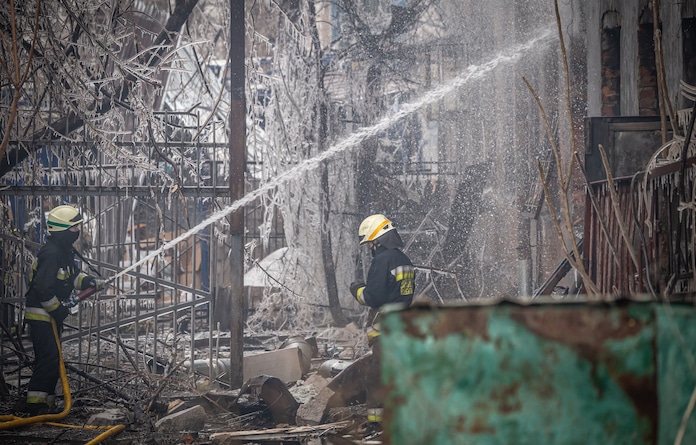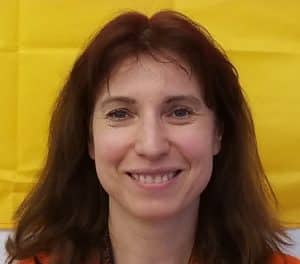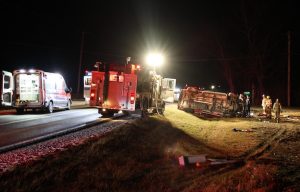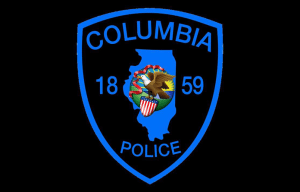Ukraine invasion hits home

As Wednesday marks Day 28 of Russia’s invasion of Ukraine, media accounts serve as one of the only ties for many to their friends and family in the war zone.
As of late last week, an estimated 3.2 million residents have fled Ukraine. One of these individuals is Roksolana, a former Ukrainian exchange student who resided in the United States for the 2008-2009 school year. For safety reasons, Roksolana’s last name and current location are being withheld.
Waterloo’s Christene Baldwin hosted Roksolana when her family lived in Kentucky. The Baldwin family still maintains a close connection with Roksolana.
Throughout most of her adult life, Roksolana resided in Kyiv, Ukraine’s capital city.
“I loved my life there. It’s heartbreaking what my people and country are going through,” Roksolana said.
As Baldwin explained, Roksolana takes great pride in her country, making having to flee a difficult subject to discuss.
At the same time, Roksolana fears for the safety of her family and friends who are still in the country, Baldwin said. One of them is Kateryna Pesotska, Roksolana’s friend from college.
Like Roksolana, Pesotska was a long-time resident of Kyiv before this recent Russian invasion led her to seek shelter elsewhere.
A morning alarm unlike any other
On Feb. 24, the first day of the invasion, Pesotska awoke to her boyfriend’s phone ringing. It was his mother calling from a Kyiv suburb. The suburb contained a military base, making her one of the first to witness the invasion, Pesotska said.
Pesotska heard shelling from her apartment. Knowing the old building would not provide protection from the impending attacks, Pesotska and her partner left.
With “pure luck,” they eventually found a “relatively safe” shelter in Western Ukraine. Through a group chat with university alumni, an acquaintance connected Pesotska, her brother’s family and her partner and his parents with a man who owned a vacant house.
“I believe it’s luck because many people are now paying crazy money for apartments and housing in Western Ukraine,” Pesotska said.
Since then, the Kyiv area has suffered multiple attacks.
From Western Ukraine, Pesotska has been helping document bombings of civilian areas – which are war crimes – by uploading videos and other evidence of Ukraine’s destruction. She’s also reporting Russian propaganda about the invasion to the proper channels to have this disinformation removed.
As far as Pesotska knows, her parents are still in Mariupol, her home city. As a city coveted by Russia, it is now fully encircled by Russian troops. Electricity, food, medical supplies and communication have been cut off.
Despite Russian demands to surrender Mariupol, Ukraine is not budging.
“Of course I’m worried about that, and I’m trying to get her out,” Pesotska said, referring to her mother.
The effort has become increasingly difficult, though, as Pesotska’s last contact with her parents was on March 2.
Last Sunday, Mariupol’s local council reported over 2,000 civilians have died from Russian attacks, a figure Pesotska was dismayed to learn. Yet, she remains hopeful knowing the Ukrainian military is fighting relentlessly for the city.
“I’m just waiting for the victory,” Pesotska said.
A family an ocean away

While she is safe over 5,000 miles away from the heat of conflict, Natalya Pruitt, a German teacher at Waterloo High School, can connect with Pesotska’s pain of knowing her family is in danger.
Pruitt describes her identity as “50 percent Ukrainian and 50 percent Russian,” and made it clear she does not support Russian President Vladimir Putin. She lived in Georgia, a country wedged between Russia and Turkey and is connected to Ukraine by the Black Sea, until she was 17. She then lived in Ukraine and Moscow for schooling.
Growing up, Pruitt frequently visited her aunts in Ukraine.
At the beginning of the invasion, some of her family was able to flee their home outside of Kyiv to a refugee camp in Western Ukraine. There, they are spending their time volunteering.
Others are still in Donetsk, a self-proclaimed breakaway state in Ukraine often considered to be a Russian occupied area.
“My oldest aunt is still in Donetsk and my cousin is in Donetsk with her family because she cannot possibly escape. She has two sons who would be grabbed and made to serve in the army, and so they cannot leave the territory,” Pruitt said. “I’m just praying that everything is OK because there are a lot of military operations going on right now. They don’t have any electricity, and water just comes and goes. It’s a very difficult situation.”
Pruitt has been able to keep in contact with her family, calling and texting them daily.
Images unlike their memories
As the war rages on, Pesotska and Pruitt have been seeing the very sites they frequented as children be destroyed.
“I’ve seen some pictures, one of which I guess was the last standing bridge (near Kyiv) by which my aunt and two cousins escaped. I think it was the first weekend after the war started,” Pruitt said. “I saw pictures of it later (after it was destroyed) and it was just heart-wrenching. It was horrible.”
Pesotska recalled attending events at the Drama Theater in Mariupol before the war. The theater was bombed by Russian forces last week despite the word “children” being written on either side of the building where hundreds were sheltering.
The casualties from this attack are unclear, as continued fighting has made it hard for rescuers to sift through the rubble. A CNN report Thursday said the theater’s bomb shelter held and “people are coming out alive.”
“Now, infrastructure in the city is almost gone,” Pesotska said of the current state of Mariupol. “It’s very hard. When you see residential property being bombed and shelled, you think ‘We’ll restore it.’ But, when you see (landmarks) being bombed, you think, ‘It’ll never be the same.’”
For Pruitt, 2022 does not mark the first time she’s seen familiar sites succumb to the horrors of war. After going to a university in Moscow, Pruitt returned home to Georgia. After a war broke out in her hometown, she was transferred back to safety in Moscow via a military helicopter as trains were bombed. Eventually, she came to the United States with her husband.
Having witnessed an attack first-hand, she said she shares a deep understanding of what her relatives in Ukraine are presently going through.
“You never forget this fear. I grew up in the Soviet Union, and if you were a (regular) citizen you actually enjoyed a great sense of security,” Pruitt said. “Everything was very secure and very safe, and all of a sudden all of it just crumbles around you when you see the tanks, when you hear the tanks, when you hear the explosions, when you hear the shelling. It’s really scary. So, I can understand what my family is going through right now in Ukraine and I’m really grateful to be here in this country.”
A united front
While the future is uncertain, Pruitt and Pesotska are confident Ukraine will not yield willingly to Russian forces.
“I’m just thinking that when everything is finished and my family in the (refugee camp) can come back, I don’t know where they can come back to. There’s nothing. They have to build their life up again from scratch,” Pruitt said. “However, I really don’t think that Ukrainians are going to put up with any kind of regime that Putin would like to impose upon them. They’ve already had a taste of freedom … I don’t think they’re going to just roll over and just accept what’s being imposed on them.”
Currently, Pruitt is working on setting up an initiative with First National Bank in Waterloo where community members can send funds directly to the refugee camp her family is helping with.
In the meantime, she recommends those wishing to help send aid through verified non-for-profits like World Central Kitchen, which has been making headlines for providing warm meals for refugees at the Ukraine-Poland border.
Other verified organizations include UNICEF, Doctors Without Borders, Ukraine’s Voices of Children, International Committee of the Red Cross and UN Refugee Agency.
On a larger scale, the world is watching how the U.S. and other North Atlantic Treaty Organization countries are responding to the invasion. Some criticize whether sanctions against Russia and financial assistance and non-lethal aid for Ukraine is enough, some echoing Ukrainian president Volodymyr Zelenskyy’s pleas for a no-fly zone over the country.
Pruitt said she noticed many arguments are being used as political fodder, distracting from the real mission: how to best help Ukraine.
“It looks like we’re more interested in pointing fingers … instead of discussing constructive steps to help Ukraine. We are facing a common enemy, and in the meantime this much smaller country which embraced our values is actually suffering,” Pruitt said. “More than ever, we do need to stay united. We can use the situation to attack the (U.S.) president, the administration, but it’s not helping anybody.”
In this way, she said Americans need to take a cue from the people of Ukraine.
“We Ukrainians are fighting for our freedom and our land. We’ve never been more united,” Pesotska said.
(This is the first of a two-part series with local angles on the ongoing Russian invasion of Ukraine. Read part two in next week’s paper.)






